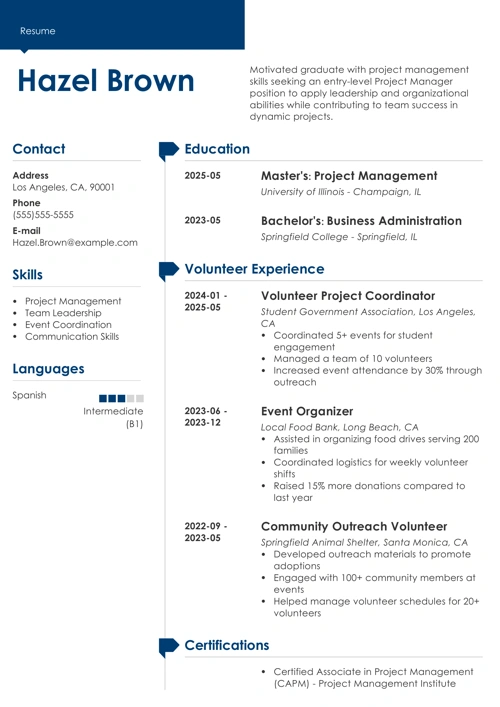Missed opportunities, wrong choices, and unfulfilling jobs. Mistakes like these leave many of us awake at 3 AM, wondering what could’ve been. But they’re also excellent learning experiences that will let you make better decisions.
That’s why I’ve asked our career experts a question: What’s your biggest career regret? Their answers uncovered peculiar ways your brain can trick you into regrettable decisions. I’m sharing them with you so you can avoid falling into the same traps they did.
Let’s get started with the first story.
Eyes on The Prize Can Get You Blind
“I should have taken more risks in my career.” That’s the opinion of 78% of the 1,000 workers Zety interviewed for our study, Biggest Career Regrets Revealed. It’s easy to see why they feel this way.
According to Zety’s survey, taking a risk paid off at least 70% of the time. So it’s understandable that the people who played it safe regretted it, as hindsight eventually showed them their odds were better than they thought.
But there’s a catch. What about the 30%?
Some people have decided to risk it, inspired by stories about someone following their gut and making the best decision of their lives. But that’s not always how the tale ends. One of our career experts can confirm that, as he belongs to the 30% whose risk did not pay off.

Maciej Tomaszewicz is a professional resume writer and career expert who has been writing for Zety since 2022, helping millions of readers. Maciej bases his advice on the wisdom he acquired throughout his career, which includes taking a chance he shouldn’t have. As he said:
“I wanted to work with PR. It would be a new field, but I wanted to make media presentations, organize events, develop PR strategies, etc. So, I applied to many junior roles. Soon, I interviewed at a small PR firm. It went well, but I had a gut feeling that I wasn't the right fit.
Despite such hesitation, I decided to take a chance to make my dream come true. I accepted the offer and quickly realized that it had been a mistake. I faced passive-aggressive behavior, swearing, and shouting. I left after a month.”
It’s easy to say he was wrong in ignoring his gut feeling. However, this kind of mistake is common for one reason.
Confirmation Bias
As the Cambridge Dictionary says, confirmation bias is a psychological principle in which we prioritize information that supports what we want to believe, leading to misjudgment.
Maciej wanted this job offer to kickstart his dream career, so he ignored his gut feeling because it contradicted what he wanted to believe. We’ve all been there. According to Dr. Courtney Warren in Lies We Tell Ourselves, confirmation bias is common and can spell disaster.
Think about the hearts broken because of red flags that went ignored.
You can probably think of a time when you made an unfortunate decision because of confirmation bias. Understanding that can make you a better decision-maker and help you avoid making this mistake again, which begs a crucial question.
How to Avoid Confirmation Bias?
The easiest way is to share your dilemma with someone you trust and get their perspective. They can give you a more objective assessment since they aren’t emotionally attached to the situation and its outcome. But there’s something you need to keep in mind before doing that.
Be honest—and that can be more difficult than you imagine. According to psychologist Michael Gazzaniga in Who’s In Charge?, people misunderstand decision-making. They believe that we consider the facts and then conclude. But the opposite is true.
Gazzaniga argues that your brain reaches an automatic conclusion when it faces a situation. Then, it frames all future information it receives in a way that agrees with that initial assessment, and that process can make sharing your dilemma with others more difficult.
When sharing your story, you can subconsciously focus on the facts that support the automatic conclusion your brain reached when first confronted with the situation. This process increases the likelihood of your friend concluding the same, even if it’s wrong. So, how do you fix that?
A list. Take the time and list all evidence supporting a decision. Then, do the same for all factors against it. Don’t rush it. The more items you have on each side, the better. Then, present the list to your trusted friend and get their opinion.
Of course, it’s impossible to be 100% objective when sharing anything with anyone, but you can try to get as close as possible to the impossible. Doing so will let you make better decisions and avoid falling into a trap, like what happened with Maciej. His story cautions against taking big chances in your career.
But there’s another side to every coin. Maciej may have regretted the day he signed his PR contract, but another Zety career expert faced a similar situation and kicked himself over not taking a leap of faith.
The One That Got Away
Paolo Borrini is another of our seasoned career experts and resume writers. He has been writing for Zety since 2021 and uses his journalist background to pen informative articles that have helped millions of job seekers. But his path to getting here wasn’t straightforward.

He dreamed of being a journalist but put that on hold to work in the hotel industry, as he needed to pay his bills. He rose through the ranks and got the chance to manage a swimming pool club. Little did he know that this managerial job would lead to a life-changing encounter, as he said.
“I met one customer who worked for an international TV station. My background impressed him, and it was similar to his. So, he invited me to his office and offered me a job as a content creator. I was enthusiastic! But then I felt scared.
That was my dream job, but accepting the offer would mean starting over from scratch after I had spent years fighting for a position in the hotel industry. I thought about it thousands of times and rejected the offer. I regretted that because it was a decision made from fear, not rationality.”
So, we have two men in opposite situations. Maciej regrets taking a chance in pursuit of his dream career, while Paolo wishes he had. That begs a crucial question: What made him turn down that offer? Let’s understand what happened so you won’t face the same regret.
Commitment Bias
Maciej and Paolo have one key difference that led them to make opposite decisions. Maciej was a recent graduate still in his career’s infancy. On the other hand, Paolo had already climbed to a managerial position, complicating his situation. He suffered from commitment bias.
It states that people usually stay committed to a path already taken, even if a better alternative becomes available. The reason is simple: Changing is uncomfortable.
For some people, that discomfort can be so overwhelming that they close their eyes to the potential benefits of taking a leap of faith. So, they instinctively reject that change and then frame everything in a way that supports their decision. That’s what happened to Paolo.
Working at a hotel had become his comfort zone, even if it wasn't the best for him. So, when he had the chance to get his dream job, the discomfort of change closed his eyes to the positives it would bring. Since all he could see was negative, he rejected the offer. He regretted that.
As Paolo said, his decision stemmed from a fear that made him see red flags that weren’t there. So, following his gut was the wrong move.
But how can you know when trusting your intuition to make a career decision is okay? There’s a game that can help.
The Five Whys
You can play The Five Whys. It’s a technique in which you define a problem and get to its core by asking yourself “why” five times. Your final answer should indicate whether the concerns your gut feeling has raised are valid or irrational. Let’s see how Paolo could’ve used it:
Problem: I’ve got a dream offer. But my gut is telling me to reject it.
- Why? The salary is initially lower than my current.
- Why would the salary be lower? Because I’ve just got a managerial role.
- Why did you get a managerial role? Because I spent three years working in a hotel, even if I didn’t like it.
- Why did you stick with a job you disliked? Because it’s become a comfort zone.
- Why is it a comfort zone? Because I’ve become used to it.
This analysis would’ve shown Paolo that he had no reason to follow his gut feeling and reject the job offer. His decision emerged from a fear of stepping out of his comfort zone and trying something new, even if it was something he desired. Now, let’s analyze Maciej.
Problem: I’ve got a dream offer. But my gut is telling me to reject it.
- Why? I just felt it wasn’t a good fit.
- Why did you feel this way? There were some red flags.
- Why were there red flags?There were no opportunities for career growth.
- Why did you feel this way? My responsibilities weren’t clear.
- Why is that a problem? That’s a sign of bad management.
Bingo! That was the source of Maciej’s gut feeling that something was wrong with the opportunity, even if he couldn’t understand why he felt that way. So, not asking himself the five whys turned out to be a mistake, but he shared that it wasn’t the only one.
“I applied to numerous jobs without researching the companies or checking reviews. That was a mistake. After I left, a colleague revealed there had been office bets on how long I’d stay. The previous employee had quit in a week, and the one before that left by lunch on their first day.”
Unfortunately, that’s a tale as old as time. Impatience to get your dream job leads you to skip steps and ignore red flags—not exactly a recipe conducive to good decision-making. At least the silver lining is that he walked away after just a month. Not everybody does that.
Should I Stay or Should I Go?
Many people choose to stay at jobs that don’t fit them. In fact, according to Zety’s survey, that’s the fifth most common career regret, and that’s a situation that one of our leading career experts faced a few years ago.

Dominika Kowalska has been Zety’s editor since 2019. She has helped dozens of writers refine their articles, ensuring readers worldwide receive the best career development insights. But if she could go back in time, there’s one piece of career advice she’d share with her younger self.
“Back in the day, I applied for a marketing coordinator position at a top logistics company. The hiring process was intense, with six steps and two interviews. You’d think the job was a big deal. But when I started there, I realized it was nothing like what the ad said.
Most tasks would better fit a junior employee or even an intern. I learned all the processes and tools in three months. The job was monotonous, and I had to force myself to show up. Despite my dissatisfaction, I stayed for almost a year.
I hesitated to leave because I didn’t want my resume to look like I was job-hopping. That was a mistake. My skills took a hit over the year I worked there, even though I had put much effort into building them at previous jobs.”
Dominika’s hesitation is understandable. Seeking a job can feel like playing a rigged game. According to Glassdoor, a posting gets over 250 resumes, while The Ladders says recruiters spend just seven seconds reading each. It’s no wonder there’s pressure to be perfect.
Whether you like it or not, recruiters will judge you based on your resume and discard it at any sign of a red flag. So, her concern was valid. But was she too cautious? Another Zety career expert shared her perspective.
“Recruiters are looking for patterns, not outliers. Staying a few months at a job looks bad if it’s a pattern. But that wasn’t Dominika’s case. She had stayed years at several companies and only had one brief experience. It’s clear she wasn’t a job-hopper.” - Danuta Detyna, career expert and certified professional resume writer
You must consider how recruiters will perceive your application. It’d be irresponsible to claim otherwise. However, an obsession with having a perfect resume can lead to unfortunate career decisions, which happened to Dominika because of the following psychological principle.
The Negativity Bias
People tend to overvalue negative information, which can have its benefits. But it becomes a detriment when it makes you believe something is more harmful than it actually is, closing your eyes to the fact that you could turn it into a positive. Let’s consider Dominika’s case.
She could’ve turned a negative into a positive. Let’s assume Dominika started seeking a new job after three months at her new company. Her main dissatisfaction was the lack of opportunities to learn new skills, which could have played in her favor.
Hiring managers love learners. Dominika’s discontentment with that monotonous job could’ve been a powerful weapon that she could’ve used to impress recruiters. So, if you’re in a similar situation, try to show how it illustrates that you have traits companies love, like these:
- Integrity
- Communicative
- Eagerness to learn
- Team-oriented
- Ambitious
- Detail-oriented
- Motivation
- Creativity
- Confidence
- Responsibility
Can you find a way to frame a negative experience from your career into something that fits these traits? If so, do it! But be ethical. After all, offering a different side of the coin is one thing. However, don’t lie to recruiters that being fired for fake reports illustrates creative thinking skills. They will see through that. After all, according to the 10th Annual HireRight Benchmark Survey, 85% of recruiters have reported uncovering lies. They’re experts in that. Don’t take the chance.
Remember that Dominika’s example works because her desire to learn was genuine. So, don’t lie. If you’re concerned a stain might hurt your resume, let’s see another type of bias that can help you ethically overcome that. Using it to your advantage would be much better than lying.
Anchoring Bias
According to psychologist Robert Cialdini, this psychological principle means that the first piece of information you receive on a topic will dictate whether you’ll see subsequent pieces positively or negatively.
You can use this knowledge when writing your resume summary: An impressive introduction will leave recruiters with an overwhelmingly positive first impression of you, dictating how they’ll see the rest of your resume. They will be likelier to overlook any stains in your work history.
Likewise, if you’re a student concerned that your lack of experience might hold you back, the anchoring effect can also save you. A positive first impression can get recruiters to overlook your inexperience.
Ultimately, recruiters want to know your skills and how well you can learn. But life is about nuance, so it’s possible to end up in a situation where you want to develop skills, which is excellent, but doing so still turns out to be the wrong choice, as our last story exemplifies.
Improper Development
Now, it’s my turn. I’ve been writing for Zety since 2019, and over 20,000,000 job seekers have read my articles. Like my colleagues, much of my advice comes from personal experience, as I've made plenty of mistakes in my career, and the biggest one happened in 2015.

“English is not my first language, and I’ve always wanted to develop an international content production career. So, I knew that I needed to polish my linguistic skills. This desire led me to pursue a translation internship in 2015. What’s so wrong about that? Let me tell you.
I went to High School in the USA. I got an English proficiency certificate from the University of Michigan, an exam that even some native speakers can’t pass. While in the US, I also won a poetry competition and placed third in a playwrighting contest. That begs the question.
Why did I want to polish my English? I was insecure about my linguistic skills because I wasn’t a native speaker, so I wasted one year working as a translator, trying to improve something I had already mastered. I regret that.
I spent most of my days translating legal documents, so I learned a lot of legalese, but nothing that became useful later in my private or professional life. That was a wasted year, and I could’ve used that time to learn new things.”
You may think I did nothing wrong. After all, nobody is perfect. Therefore, no matter how good you are, there’s always room for improvement. Yes—but the more you improve, the more difficult it gets to make future gains, so you eventually reach a point of diminishing returns.
Think of this article, for example. It will never be perfect, and the more time I invest in it, the better it’ll get—hopefully. But is it wise to spend a week polishing this piece so it jumps from 95% to 97% quality score, while I could have written five other 95% articles in the meantime? No.
It’s the same with skills. I’m not telling you to be a jack of all trades, master of none. But your time is finite, and when investing it in a skill, it’s always good to avoid wasting it by obsessing over something. A great way to do that is to understand why I was insecure with my English.
The Impostor Syndrome
Many people downplay their accomplishments or skills, often attributing any success to external factors. That’s the impostor syndrome.The Behavioral Science Research Institute believes that 70% of adults suffer from this problem at least once in their lifetime. I joined that statistic.
I’m from Brazil. According to the British Council, only 1% of Brazilians speak English fluently. There are numerous reasons, like the inefficiency of public schools in teaching this language. This forces people to seek private English classes, which are unaffordable to most.
I was fortunate enough to be born into a family that could afford to pay for my linguistic education, and later, I went to high school in the United States. We weren’t millionaires, but I was privileged compared to the average Brazilian, and that triggered my impostor syndrome.
I believed that speaking English wasn’t something earned; it was a gift, a mere byproduct of being born into the right family. I thought I needed to keep putting much effort into improving my linguistic skills to feel like I deserved them. That was a mistake. So, how did I solve that?
I’d love to tell you about some silver bullet that can kill any impostor within you. But the truth is that I overcame this problem naturally. As I became more mature, I eventually started to accept my accomplishments. But that took years, so let’s see how that process could’ve been quicker.
How to Beat the Impostor Within You?
Acknowledge your feelings instead of trying to bury them. Writing can help. Journaling can lead to a more objective view of reality. You can start a journal where you share your accomplishments and the role you played in making them happen.
Such an approach will hopefully let you see your effort and appreciate it more.
Conclusions
All the mistakes and regrets shared in this article have one similarity. They happened only once because we learned from them. In the end, that’s what matters. Today, we can share our experiences with millions of readers, and that’s the biggest lesson from this article.
I hope this article will help you make better decisions, but don’t worry if you still make some mistakes in your career. That’s an inevitable part of being human. A bump in the road isn’t the end, even if it may seem like that in the heat of the moment, as Paolo mentioned.
“I regretted not taking that job and beat myself over it for a long time. But I’m happy where I am today, and if I had accepted that offer, I probably wouldn’t be here.”
Likewise, Maciej landed on his feet and is now a top career expert, while Dominika has become a leading voice in the resume-writing industry. As for me, here I am. I fulfilled my ambition of being an international content creator.
Of course, it’s impossible to say how things would’ve transpired had those mistakes never happened. Perhaps our lives would have been better—But maybe not. Either way, we’re happy with what we have now. Our regrets started a new chapter in our journeys.
Sources
- Turczynski, Bart. “Biggest Career Regrets Revealed: Learn from Others’ Mistakes.” Zety, Accessed 10 November 2024
- “Confirmation Bias.” Cambridge Dictionary, Accessed 10 November 2024
- Warren, Courtney. Lies We Tell Ourselves: The Psychology of Self-Deception, 1st ed., San Rafael, Insight Publishing, 14 March 2014
- Hancock, Matthew and Zahawi, Nadhim. Masters of Nothing: How the Crash Will Happen Again Unless We Understand Human Nature, 1st ed., Hull, Biteback Publishing, 15 May 2012
- Gazzaniga, Michael. Who's in Charge?: The Neuroscience of Decision-Making, the Notion of Free Will and the Idea of a Determined World, 1st ed., New York, Ecco Press, 15 November 2011
- Staw, B. M. (1976). Knee-deep in the big muddy: a study of escalating commitment to a chosen course of action. Organizational Behavior and Human Performance, 16(1), 27–44
- Hancock, Jonathan. “5 Whys - Getting to the Root of a Problem Quickly.” Mind Tools, Accessed 10 November 2024
- “50 HR and Recruiting Stats That Make You Think.” Glassdoor
- “Eye-Tracking Study.” Ladders, 2018
- Moore, Catherine. “ What Is Negativity Bias and How Can It Be Overcome?” Positive Psychology, Accessed 10 November 2024
- Nason, Jennie. “10th Annual HireRight Benchmark Survey Finds 48 Percent of Employers Do Not Rescreen Employees, Despite Prevalence of Organizational Risk.” Business Wire, Accessed 10 November 2024
- Cialdini, Robert. Influence: The Psychology of Persuasion, Revised Edition, New York, Harper Business, 26 December 2006
- “Imposter Syndrome.” Psychology Today, Accessed 10 November 2024
- Sakulku, Jaruwan and Alexander, James. "The Impostor Phenomenon." The Journal of Behavioral Science, vol. 6, no. 1, 2011, pp. 75–97
- “In Brazil, only 1% of the population speaks English fluently.” The Rio Times, Accessed 10 November 2024.


